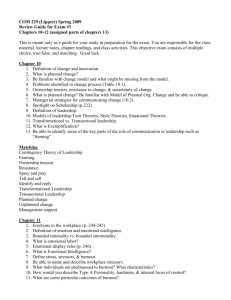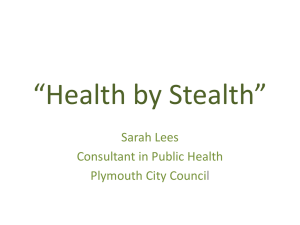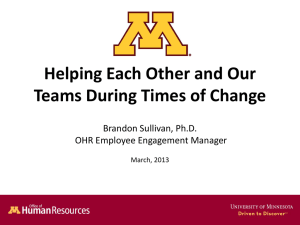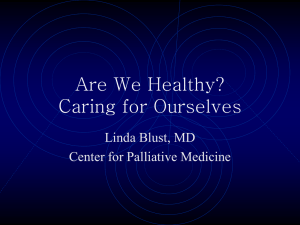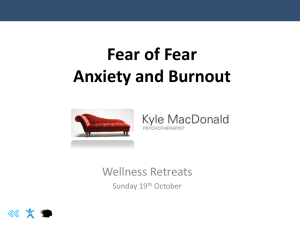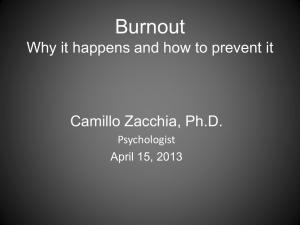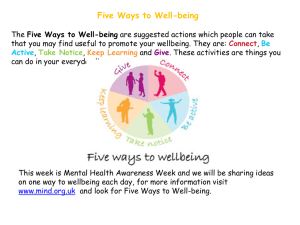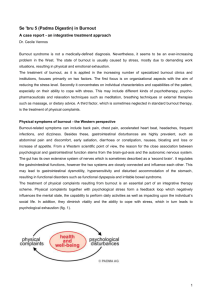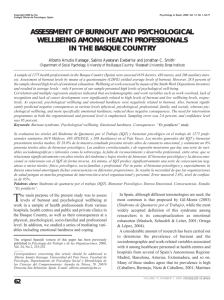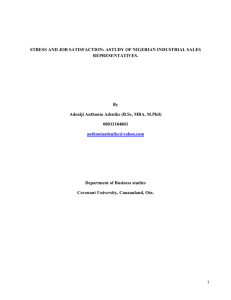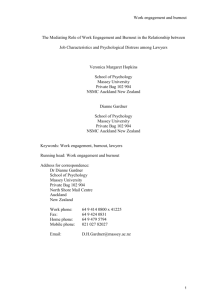The link between engagement and individual
advertisement
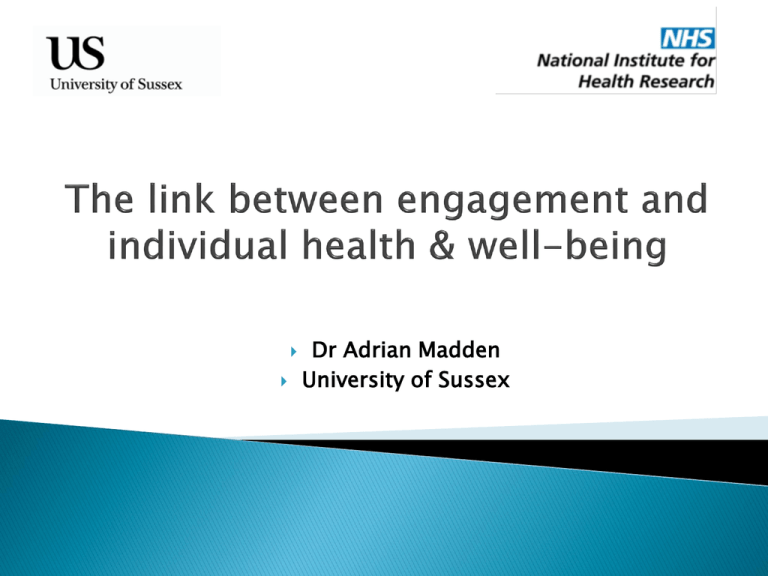
Dr Adrian Madden University of Sussex Research team: Professor Katie Truss (University of Sussex), Dr Adrian Madden (University of Sussex), Dilys Robinson (IES), Dr Kerstin Alfes (Tilburg University), Luke Fletcher (IES), Jenny Holmes (IES), Jonathan Buzzeo (IES), Professor Graeme Currie (University of Warwick) These are emerging findings based on independent research funded by the National Institute for Health Research (Health Services and Delivery Research, 12/5004/01 – Enhancing and Embedding Staff Engagement in the NHS: Putting Theory into Practice). The views expressed in this publication are those of the author(s) and not necessarily those of the NHS, the National Institute for Health Research or the Department of Health. COPYRIGHT OF THE CONTENTS OF THESE SLIDES BELONGS TO THE UNIVERSITY OF SUSSEX AND THE NIHR, AND COPYRIGHT TO THE SLIDES BELONGS TO PROFESSOR KATIE TRUSS. THE SLIDES CANNOT BE COPIED OR REFERRED TO WITHOUT WRITTEN PERMISSION. THIS PRESENTATION IS BASED ON PRE-PUBLICATION FINDINGS AND SHOULD NOT BE CITED. © Katie Truss Overview • Total number of relevant studies identified by the study = 5,771 • By applying a range of quality criteria, 214 items were included for full evaluation and from which data were extracted • Those concerning individual health & wellbeing and engagement were found in articles which assessed: ‘morale’ – i.e. the effect of engagement on health & well-being as outcomes ‘antecedents’ of engagement – i.e. the effect of health & well-being on engagement, as an outcome The link between engagement and morale We interpreted the link between engagement and ‘morale outcomes’ in a wide sense. We evaluated studies which considered: 1. Measures of life satisfaction 2. General and psychological health 3. Stress/burnout 4. Various other aspects, such as work ability, HR approaches and recovery/relaxation The relationship between engagement and wellbeing/health perceptions in the health context and in the wider workforce 1. Life satisfaction • There is an approach to health which tends to see it as the absence of illness, and in the case of engagement this has meant a lot of research has focused on ‘burnout’ as the absence or engagement. However, for a number of reasons work-related well-being is increasingly assessed using more positive approaches, one of which is life satisfaction - “a cognitive and global evaluation of the quality of one's life as a whole” and is associated with certain things like organizational commitment but also reduced mortality. • Using a longitudinal approach Hakanen and Schaufeli’s (2012) study with dentists in Finland found that work engagement positively predicted life satisfaction over three and four year periods and that a positive state of work engagement negatively predicted symptoms of depression over a longer seven-year study period. • Other studies in different industries – construction, restaurants and multi-industries, confirm the postiive association between engagement and life satisfaction. • In one particular study, Shimazu et al (2012) looked at people working in a range of occupations over a period of 18 months in Japan and considered engagement in relation to well-being, unwell-being, workaholism, and socioeconomic status. The interest in workaholism raises an interesting point about the distinction between engagement as a positive engagement with work, and workaholism as an over-engagement with work, with negative consequences. They found over the 18-month study that workaholism led to impaired health (in terms of number of physical complaints) and life satisfaction, while engagement led to improved health, life satisfaction and also better performance. The relationship between engagement and wellbeing/health perceptions in the health context and in the wider workforce 2. General and psychological health • Some studies provided evidence of the link between work engagement and general/psychological health as an outcome. Freeney and Fellenz (2013) used the General Health Questionnaire to assess this link amongst midwives in Ireland and found that engagement was a better predictor of things like mental well-being and `physical health’ than social support. This is a finding which the authors themselves expressed some surprise over as it challenges other findings about the importance of workplace social support (e.g. reliance on others) for engagement. • Looking to research in the general workforce, a number of other studies confirmed that engagement was negatively associated with ill health both in cross-sectional and time-lagged studies. Others showed negative correlations between engagement and depressive symptoms, somatic complaints, psychological distress and sleep disturbances. • However, (Buys and Rothmann, 2010) showed that the links between engagement and somatic functioning and depressive symptoms were much less significant that the link with emotional exhaustion. The relationship between engagement and wellbeing/health perceptions in the health context and in the wider workforce 3. Stress and burnout • Burnout is defined as the expression of cynicism, inefficacy and exhaustion, and since engagement has been defined as the absence or opposite of burnout, lots of research into engagement has focused on burnout and stress. However, rather than just being the opposite of burnout, engagement has been redefined as a distinct concept in its own right, expressed along 3 dimensions of vigour, dedication and absorption. • Consequently, in this research project we did not look at studies which solely addressed ‘burn out’. We did include research which looked at burnout and other factors such as stress within a wider set of health outcomes linked to engagement. It confirms that engagement is strongly and negatively associated with burnout, but where other factors are brought to bear, this relationship is not straightforward. Fong and Ng (2012) for instance showed within elderly care settings in China that engagement is negatively associated with both stress and burnout but the association between engagement and stress is much weaker than for burnout. • Studies in the general workforce confirmed this generally negative association but some challenged the consistency of the results, showing for example that stress and burnout was associated with one or two dimensions of engagement but not all three. For instance, in their study with almost 200 Norwegian teachers Hoigaard et al (2012) found that only absorption was significantly associated with emotional exhaustion. So again, the evidence for association between engagement and stress/burnout is there but it’s not unequivocal. The relationship between engagement and wellbeing/health perceptions in the general workforce – looking for evidence in other settings 4. Other aspects • Other studies sought to examine the link between engagement and other health and well-being relatedfactors although these were very few in number. In one of these studies, Mache et al (2013) found that engagement was positively associated with what they called ‘work ability’, i.e. ‘the sum of factors enabling an employed person in a certain situation to manage his/her working demands successfully’. These factors included things like psychological resources, the amount of sick leave taken over the previous year but also performance outputs. This is a positive finding but because the people involved in the research XXX selfreported their sick-leave, reliability is a concern. • Jenkins and Delbridge (2013) conducted a comparative qualitative study within two UK-based organisations in a non-health context. They found that engagement may not be universally ‘good’ for morale as it depends on the way in which management view engagement and its purpose as well as benefits. They suggest that if engagement is pursued for purely instrumental purposes (such as for performance or competitive advantage) then it may be detrimental to morale whereas if engagement pursued as a legitimate outcome in its own right then engagement may promote morale. • Kunhel and Sonnentag (2011) looked at the effects of holidays on wellbeing among school teachers in Germany and showed that although breaks from work did positively affect engagement it did so for about a month only. This recovery could be extended by introducing relaxation techniques during leisure time after returning to work but not for long as the benefits were short lived. The effect of health & well-being as antecedents of engagement Studies that looked at health & well-being as antecedents of engagement fell into two broad categories: • Individual psychological states as antecedents Among the small body of research in the healthcare context, one qualitative study of 15 nurses and midwives found that self-care and self-tuning could be used as coping mechanisms to maintain engagement levels and wellbeing (Bakibinga et al, 2012). ‘Self-tuning’ is defined as the way that people adapt their work behaviour to cope with the kind of stress that arises when they feel overwhelmed – too many demands and not enough personal resources to meet them. What the researchers found was that there were positive and negative ways of coping, with differential impacts on engagement. So, for example, where nurses used their time off to mediate or manage stress as a coping strategy this was seen to help maintain their personal resources. However, other forms of coping – such as transferring care of a patient to other caregivers – could negatively affect emotional wellbeing as it could lead to feelings of guilt (based on a perception of failing to meet professional or vocational ideals). This finding about the importance of coping was more widely supported in studies within the general workforce where the kinds of individual attributes that received most attention was self-efficacy, resilience, and personal resources, in other words, the positive perceptions that individuals hold of their personal strength and belief in their own ability. The 10 studies which looked at these attributes, including some longitudinal research, showed a positive association between them and engagement. • Organisational interventions Very few studies evaluated specific organisational interventions around health and wellbeing (such as training) and engagement. Those that did also focused on building individual resources such as coping or resilience. For example, one study (Rickard et al, 2012) in the health care context looked at stress and workload reduction among general nurses and midwives in Australia. The intervention included things like stress reduction techniques but the findings were less than straightforward. What was found was that although the intervention did impact on psychological health, it didn’t affect engagement. This suggests that perhaps specifically in the healthcare context, work engagement isn’t something that can be easily isolated from other things and may reflect that the vocational nature of nursing and other healthcare roles makes understanding engagement a more complex challenge than in other occupational settings. Conclusions and issues • The evidence suggests that there is a generally positive association between individual health, well-being and engagement, measured in terms of life satisfaction, general and psychological health, etc. • Research reveals interesting links between personal resilience and engagement within the healthcare context … • … but the evidence base overall is quite narrow and results are not always clear, even when drawing on wider research from the general workforce • Most research is cross-sectional and self-reported. This is a distinct weakness of the evidence concerning health and wellbeing, meaning that more rigorous research is needed • This is particularly the case in the health context where the positive benefits of engagement, or the negative impacts of burnout and stress, cannot be so straightforwardly explained among nursing and other health staff.
